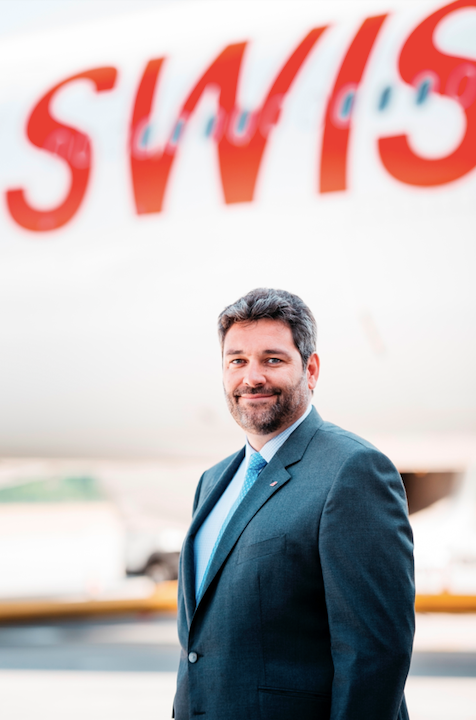Swiss WorldCargo premiered its first ‘cargo-only’ flights in the end of March 2020, with two Airbus A340-300 flights connecting Hong Kong to Zurich. The carrier also developed the SWISS Belly Charter concept, with which cargo only flights were offered to customers, either as a full charter flight or with specific space on the aircraft sold. In a short span of time, these flights connected different cities around the world. In May, Swiss WorldCargo reached another milestone: three of its Boeing 777-300ERs had their economy class cabin seats removed, in order to add up to 12 additional tonnes or 36 per cent additional cargo capacity in the cabin. The so-called CARRY flights (CARgo in the cabin with Removed Y-class seats) quickly became popular and were used on routes worldwide. As of December 2020, Swiss WorldCargo had carried out over 1,000 cargo-only flights and transported over 23,000 tonnes of cargo. Since the beginning of 2021, the carrier has continued expanding its network, with flights to destinations outside of the traditional SWISS and Swiss WorldCargo network. In addition, the carrier has been constantly focussing on efficient global transportation of COVID-19 vaccines. Lorenzo Stoll, the newly elected Vice President and Head of Cargo in an exclusive conversation with Ritika Arora Bhola, says that in these truly extraordinary times, they are proud to have continued adhering to their primary values of quality, reliability, and stability,with a host of ‘out of the box” solutions, especially now as they look forward to supplement their existing network and meet the strong demand to ship cargo worldwide.
With experience of over a decade in the air cargo industry, how has your journey been? How has the industry changed since the time you stepped in?
While I enjoy almost a decade of experience in aviation, I have only worked in the air cargo industry for a few months now. Nonetheless, in my former position as Head of Western Switzerland at Swiss International Air Lines, I often worked with our colleagues in cargo. During this time, I did see some broader changes across the entire aviation sector.
What is clear to me is that the aspect of digitalisation has already increased in the last decade and will only continue to be more important in the future. For example, today, the industry has moved from paper boarding passes to electronic solutions. However, this is something where I believe cargo has to continue to adapt in the coming years. Technology and new innovative solutions will only continue to gain importance and the industry has to stay highly engaged, supported and connected.
Could you elaborate to us about the best-in-industry practices and sound strategies you are employing for efficient operations at Swiss by understanding the needs and complemented by your expertise of many years?
Indeed, I was thrilled to join the organisation in early April of this year. As we all know, the last year and a half has been very difficult for our industry and we have had to make many adjustments and focus on coming up with – at times – very creative solutions for the future.
My main priorities will be to offer leadership and guidance for our global teams. With over 200 people working in different global stations, it is important to have strong support for our team members both in Switzerland and worldwide. Likewise, I intend to focus on continuing to ensure that our customers are satisfied. At Swiss WorldCargo, we would continue, as always, to come up with the right offers to effectively support our customers and meet their diverse needs, no matter where they are in the world.
So, basically, how are you further planning to strengthen the carrier’s leading position in international competition?
As mentioned, one of our core focusses will be to maintain closeness with the customer all along the value chain. We want to ensure that we would continue to meet our customer’s need worldwide, by offering what we are known for—safe, reliable, and speedy transportation. In addition, over the years we have enjoyed a reputation as the carrier of choice for care-intensive goods or those that require additional measures for effective and safe transport. Going forward, we intend to further focus on this offering.
Likewise, we seek to make further inroads in establishing a leadership role in digitalisation. I fully believe that one of our largest strengths will come from our ability to introduce new technologies and push forward the frontiers of our efforts to fully digitalise the transactions for all players in the supply chain. Finally, I hope to also enhance the carrier’s sustainability efforts. Swiss recently launched its usage of Sustainable Aviation Fuel (SAF). Alongside other initiatives, the ongoing investments into SAF are a good way for us to ensure that we continue to be seen as the sustainable carrier of choice.
How is Swiss taking full advantage of the already available advanced technologies or the innovative tech-driven business models for efficient business operations?
Digitalisation is a high priority for us and will continue going forward as well. In recent years, we have sought to increasingly digitalise our processes, for instance, the growth of our e-AWBs (Electronic Air Waybills). There are still many areas in which I think that air cargo as a whole will need to move to a more digitalised approach, such as—the online bookings process. In this sense, we hope to play a leading role in helping to define new digital processes and opportunities.
Take us through Swiss WorldCargo ongoing initiatives and procedures to fulfil every project requiring safe transport and delivery of vaccines in huge quantities. What are the steps that are well underway?
We are proud to have carried out many complex project shipments around air delivery of vaccines to diverse customers and locations worldwide in recent months. Just last week, we shipped over 20 tonnes of vaccines to Santo Domingo on a special flight, as part of our motive to support the Dominican Republic.
Our efforts in vaccine delivery are part of our core offering in pharma transport. Swiss WorldCargo has established itself as a leading carrier in the transport, handling, storage and management of temperature-sensitive goods such as pharmaceuticals. Therefore, we are able to draw upon our extensive experience in this field in order to successfully carry out the complex task of shipping vaccines worldwide.
What are the bottlenecks you see when it comes to delivering pharmaceuticals worldwide in such large quantities?
I wouldn’t say bottlenecks, but during the pandemic, we have often flown to destinations outside our traditional network. This has been one way for us to meet the increased demand and this has allowed us to reach new destinations and transport goods even quicker than usual. However, it has also called for extensive coordination and establishing new processes at each of our stations.
Could you reveal more on the world-class infrastructure and cold storage facilities to stock, handle, and transport temperature-sensitive products and ensure trusted solutions for your customers?
Our state-of-the-art infrastructure and cold storage facilities are indeed a part of our offering. We have several features which help us to provide an attractive offering for our customers.
First, we have played an important role in the transport of temperature-sensitive products over time, so our experience and know-how in this field is not to be underestimated. At the same time, our ability to link together different connectivity nodes and gateways worldwide is important. Specific investments in cold storage facilities in diverse locations as well as investments in concepts such as our pharma corridors which provide excellent handling capabilities across destinations are also important and help us to successfully position ourselves.
As the recognised leading pharma carrier, we are happy to have recently been selected by Envirotainer as the launching customer for their new generation of sustainable EnvirotainerReleye® RLP containers that offer over 90 per cent more efficient emissions.
Could you inform us on Swiss WorldCargo’s freighters and ground handling operations worldwide?
Since March 2020, we have transported goods using our cargo-only passenger aircraft. In this sense, we have been able to effectively meet the strong demand for cargo during this time period. However, our core offering as a belly cargo carrier—is that we transport goods in the bellies of our aircraft, wherein we are able to supplement our passenger transport efforts. Our capacity both in ‘preighters’ (passenger aircaft used as cargo-only) as well as bellies is particularly strong on our intercontinental flights. Our flagship Boeing 777-300ERs as well as our Airbus A340-300s and Airbus A330-300s offer large amounts of cargo space. As already mentioned, we have established ourselves with the focus around transportation of care-intensive, high-value goods, such as valuables, engineering components, and pharmaceuticals.
What would you like to comment on the trade emerging out of India for Swiss World Cargo? In general, what are the key items transported to and from India?
We mainly transport goods including (but certainly not limited to) pharmaceuticals, precision engineering goods, and heavy machinery between Switzerland and India. Near to long-terms plans are largely dependent on what and which sector India continues to develop in the future and which will help shape export trends in the coming years. Thanks to our local team, we are in close contact with many players in the Indian supply chain sector and constantly exchanging thoughts and ideas about the needs and opportunities that may arise.
Do you have plans to expand the concept preighters in the coming years?
During the COVID-19 pandemic, we launched the use of preighters worldwide in order to supplement our existing networks and meet the ongoing strong demand to ship cargo worldwide. However, we see this as a temporary measure. In the coming months, we plan to switch back to our traditional model of working exclusively as a belly carrier. In this sense, we would be able to successfully fly our business and leisure travellers, with cargo serving as an important supplement to our passenger routes.






